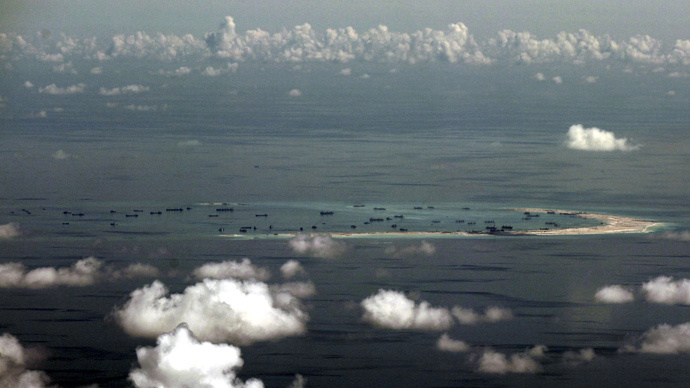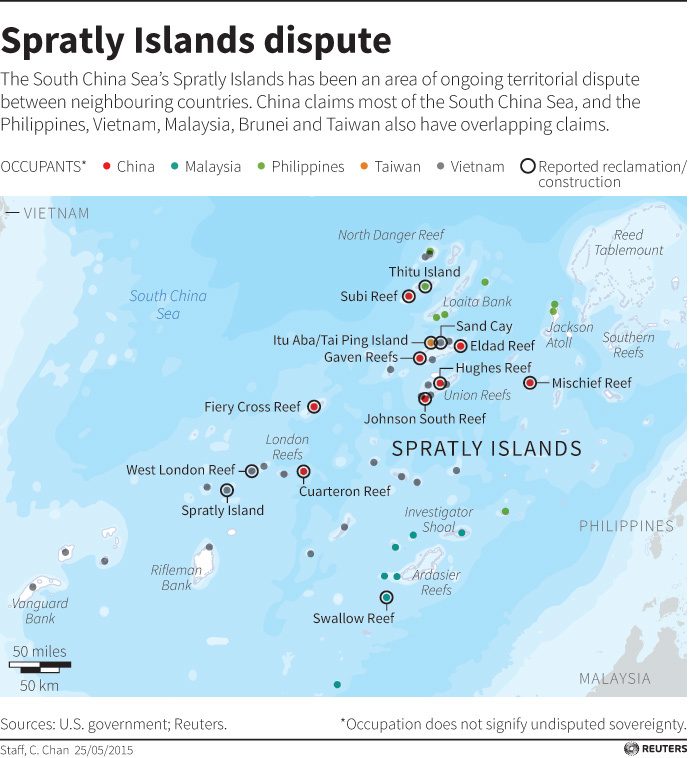Beijing rejects US criticism over construction in South China Sea

China has rejected US criticism concerning construction work, which is taking place on a series of disputed islands in South China Sea. Beijing says its presence is a peaceful one and is merely “improving the functions of the relevant islands and reefs.”
“The situation in the South China Sea is on the whole peaceful and stable, and there has never been an issue with the freedom of navigation,” said Admiral Sun Jianguo, the deputy chief of the general staff department in the People's Liberation Army, during a summit in Singapore on Sunday.
He added that Chinese authorities have carried out construction on some of the islands in the South China Sea “mainly for the purpose of improving the functions of the relevant islands and reefs, and the working and living conditions of personnel stationed there.”
The highly disputed Spratly Islands are a group of more than 750 reefs, islets and islands in the South China Sea. China claims the vast majority of the sea, despite being involved in territorial disputes with the Philippines, Vietnam, Taiwan, Brunei and Malaysia.

"Apart from meeting the necessary defense needs, it is more geared to better perform China's international responsibilities and obligations regarding maritime search and rescue, disaster prevention and relief, maritime scientific research, meteorological observation, environmental protection, safety of navigation, fishery production, services,” said Sun.
According to the Chinese military official, Beijing has always “kept in mind the larger interest of maritime security" when dealing with “maritime disputes with relevant neighboring countries.”
"In spite of the sufficient historical and legal evidence and its indisputable claims, rights and interests, China has exercised enormous restraint, making positive contributions to peace and stability of the region and the world at large," Sun added.

The statement from Chinese military official comes in response to a statement from US Defense Secretary Ash Carter who said on Saturday that Beijing is threatening security in the Pacific.
READ MORE: 'Ditch Cold War mentality': China hits back at US DoD report
"There should be an immediate and lasting halt to land reclamation by all claimants," he said, adding that the US “also opposes any further militarization of disputed features."
Carter stressed that Beijing “reclaimed over 2,000 acres, more than all other claimants combined and more than in the entire history of the region. And China did so in only the last 18 months.”
READ MORE: Defense to offense: China unveils new military strategy to boost naval capability
The tension between the US and China comes almost a week after Beijing unveiled a new military strategy, signalling ambitions for a greater naval presence in the region.
“The [People's Liberation Army] Navy (PLAN) will gradually shift its focus from "offshore waters defense" to the combination of "offshore waters defense" with "open seas protection," and build a combined, multi-functional and efficient marine combat force structure,” said the document.
READ MORE: Japan to join US-Aussie military drills in July
The so-called reconnaissance missions by the US have led to growing tensions between Beijing and Washington as the latter continues to boost its military presence in the Pacific.
On May 25 China lodged a formal complaint with the Washington concerning a US spy plane, which flew over the area in the South China Sea.
READ MORE: US official ‘misspoke’ about sending B-1 bombers to Australia amid S. China Sea dispute
The Spratly Islands also present concerns for US military. In March Washington accused Beijing of "unprecedented land reclamation," saying China is "creating a great wall of sand" over four sq km, in the disputed area in the South China Sea.
Washington is bolstering its own military presence in the region, with the US navy fleet commander Harris saying the United States is currently preparing to shift 60 percent of its fleet to the Pacific by 2020.
Chinese authorities insist their territorial claims have a historical basis and the US should not meddle in these disputes.












